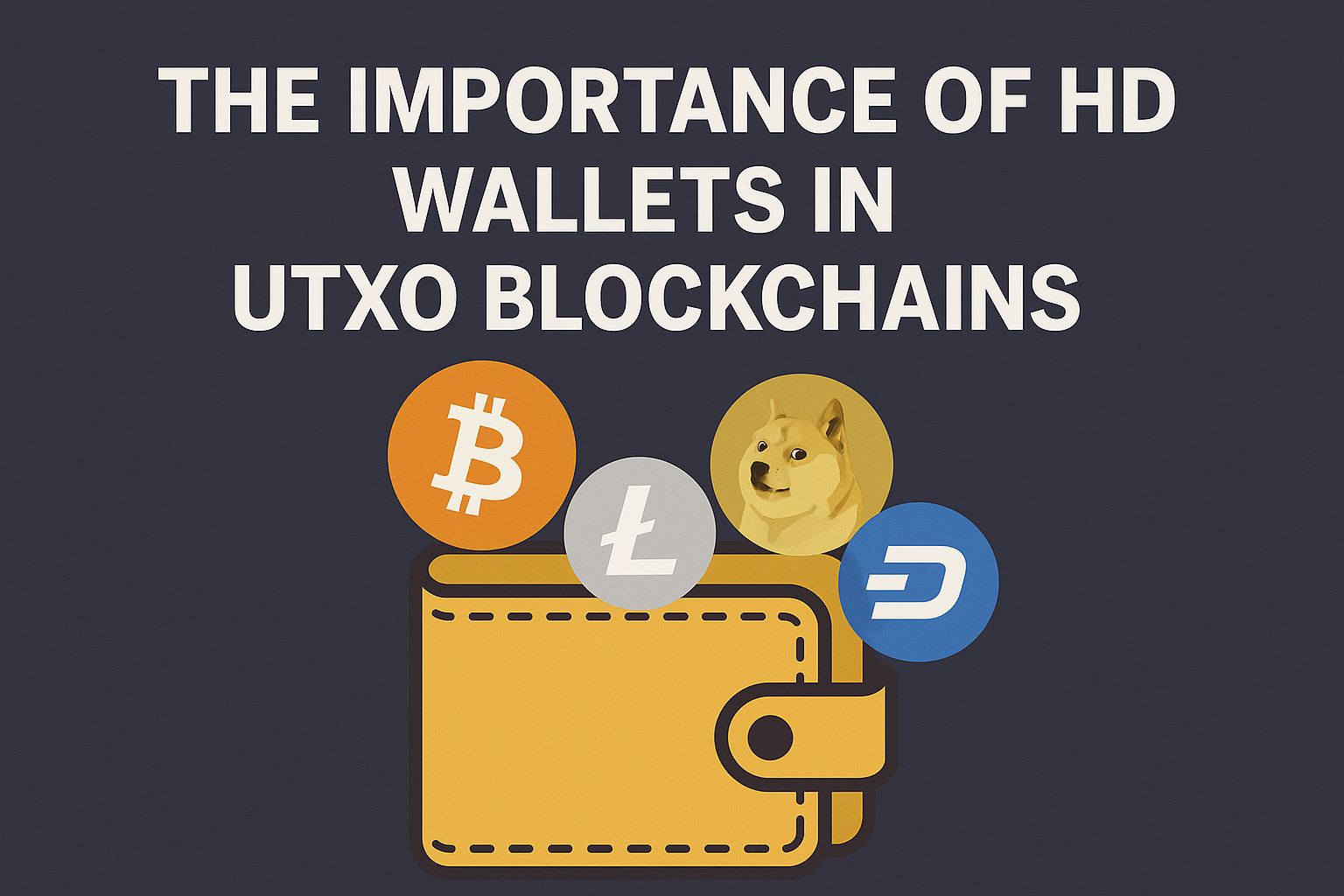In UTXO-based blockchains like Bitcoin, Litecoin, Dogecoin, and Dash, secure wallet management is critical. Hierarchical Deterministic (HD) wallets have become the standard, simplifying backups while enhancing both security and privacy. From address derivation standards to extended public keys (xpub, ypub, zpub), HD wallets power modern crypto storage and payment systems.
What Are HD Wallets in UTXO Chains?
An HD wallet, defined in BIP32 and BIP44, is a wallet that generates all of its keys and addresses from a single master seed (usually expressed as a 12–24 word mnemonic).
Instead of storing hundreds of unrelated private keys, an HD wallet uses deterministic derivation to create a tree of keys. This means you can always regenerate the same wallet from the seed, no matter how many addresses have been used.
How HD Wallets Work
HD Wallets use a singular seed phrase that is tied to a singular seed. From that seed, you can derive all the appropriate public/private key pairs down the path. This is also the process by which a singular seed phrase can operate on multiple blockchains. By changing the coin type from Bitcoin (0) to Litecoin (2), Dogecoin (3), or Ethereum (60), you can build all the appropriate wallets with a singular seed from a singular seed phrase. This is why you can have a multi-chain wallet with a singular struture.
- Master Seed ? Master Key
- A mnemonic (12–24 words) generates a master private key and chain code.
- Hierarchical Tree Structure
Keys are derived following standard paths like:
m / 44′ / 0′ / 0′ / change / address_index
-
- m = master
- 44′ = BIP44
- 0′ = coin type (Bitcoin in this example)
- 0′ = account
- change = 0 for receiving addresses, 1 for change addresses
- address_index = sequential index of the address
- m = master
- Receiving vs. Change Addresses
- Receiving addresses (…/0/x) are the ones users share to accept payments.
- Change addresses (…/1/x) are generated internally by the wallet to keep transactions efficient and prevent address reuse.
- Receiving addresses (…/0/x) are the ones users share to accept payments.
- Extended Keys
- Each node in the tree can be represented as an extended private key (xprv) or extended public key (xpub).
- With the xpub, anyone can generate receiving addresses (but not change addresses, unless explicitly derived).
- Each node in the tree can be represented as an extended private key (xprv) or extended public key (xpub).
- Automatic Address Rotation
- For every new payment, the wallet provides a fresh receiving address.
- Internally, wallets also rotate change addresses, ensuring funds are split across multiple addresses for better privacy.
- For every new payment, the wallet provides a fresh receiving address.
Benefits of HD Wallets
Security
- Single backup: Just the seed phrase recovers the entire wallet.
- Watch-only setups: You can safely share xpubs for monitoring without exposing private keys.
- Hardware compatibility: Ledger, Trezor, and similar wallets rely on HD standards.
Privacy
- Address reuse avoidance: Each transaction uses a fresh receiving address.
- Transaction unlinkability: Use of change addresses makes it harder to cluster wallet activity.
- Flexible UTXO management: Wallets can split and merge coins across multiple addresses.
Address Types and Derivation
Address types in UTXO blockchains determine the fee efficiency, compatibility, and format of your wallet.
| Extended Key | Address Type | Format Example | Script |
| xpub | Legacy | 1ABC… | P2PKH |
| ypub | Nested SegWit | 3ABC… | P2SH-P2WPKH |
| zpub | Native SegWit | bc1qxyz… | P2WPKH |
| Zpub (multisig) | Native SegWit multisig | bc1q… | P2WSH |
Best Practice: Use zpub (Native SegWit) for lowest fees and modern compatibility, but legacy (xpub) may still be required by older exchanges or services.
Extended Public Keys (xpub, ypub, zpub)
An extended public key (xpub/ypub/zpub) lets you:
- Generate an unlimited number of receiving addresses deterministically.
- Share with e-commerce systems or accountants to monitor transactions.
- Keep private keys offline while still supporting integrations.
Warning: Sharing your xpub reveals all past and future receive addresses and transaction history for that account. Never publish it publicly.
Popular Wallets and Exporting Public Keys
With Blockchain Payments for Salesforce, we support UTXO HD Wallets. At this time, Blockchain Payments is a read only wallet, which means you need a separate wallet for spending the Bitcoins. The Blockchain Payments internal wallet tracks the receiving and respending of those coins.
Here’s how to work with HD wallets across popular UTXO software and hardware wallets:
Bitcoin
- Exodus ? Export guide (Desktop only; creates exodus-exports folder with xpub/zpub).
- Electrum ? Go to Wallet ? Information, copy “Master Public Key.” (Electrum guide)
- Coinbase Wallet ? Automatically generates SegWit addresses (bc1q…); no direct xpub export for security.
- Ledger & Trezor ? Accessible in Ledger Live or Trezor Suite via account settings ? Show XPUB. (Help guide)
Litecoin
- Litewallet (official) ? Supports SegWit (ltc1q…), with derivation following BIP44.
- Electrum-LTC ? Same steps as Electrum BTC (Wallet ? Information).
- Exodus ? Same export method as Bitcoin.
Dogecoin
- Doge Core ? Full-node wallet (no standard xpub export, since it doesn’t implement BIP32).
- Exodus / Atomic Wallet ? Dogecoin supported, but no public export of xpub.
- Ledger ? Derivation paths supported; xpub export via Ledger Live.
Dash
- Dash Core ? Full-node wallet; doesn’t natively use HD paths in the same way.
- Electrum-Dash ? Same as Electrum BTC; supports xpub exports.
- Exodus ? Supports Dash; export method same as for BTC.
Best Practices with HD Wallets
- Always back up your seed phrase offline and securely.
- Prefer SegWit addresses (zpub / bech32) when possible for lower fees.
- Use hardware wallets (Ledger, Trezor) for long-term storage.
- Use watch-only wallets for accounting and monitoring, but never share xpubs publicly.








